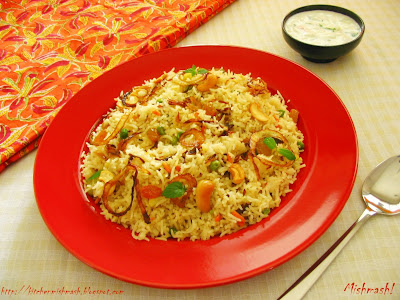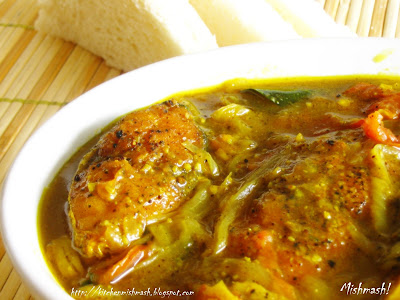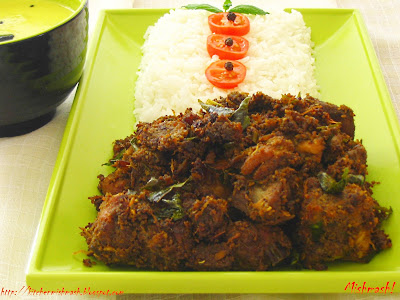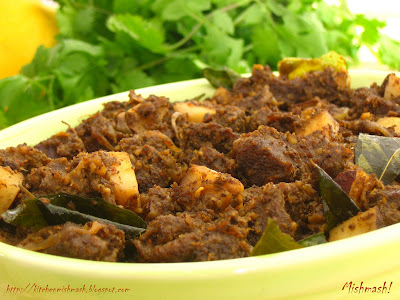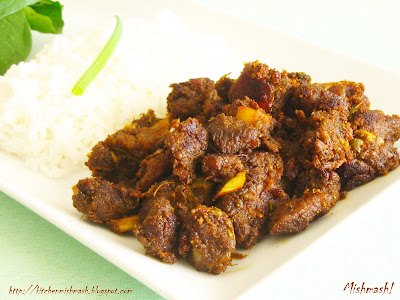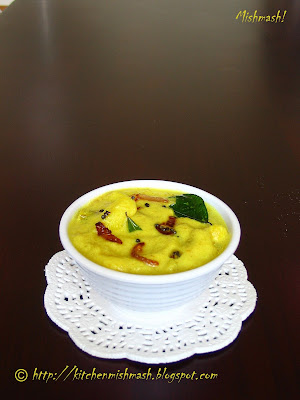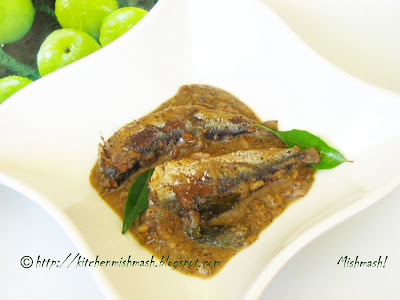
In my last post, I tried to paint the faces of Subaida, Umma and Bappa, some of the yarns in my childhood fabric, who belong to the Kerala Mulsim community and stirred my memories of the rich aromatic food they served, especially during the festival days of Ramzan and wedding ceremonies like Mailanchi Kalyanam and Nikah. From there I introduced you to a more prominent and distinct culinary pocket of Kerala, Malabar Coast, densely populated by Moplahs (Malabar Muslims) who crown the northern coast of our homeland with their flavorful and rich cuisine. Coming from the central part of Kerala, my experience with this cuisine practically starts with Pathiri, paper-thin flat soft rice breads and ghee flavored fried rice called Neichoru and ends with the Kozhikkodan Halwa, which we had a couple years back from the energy packed, 'Mittai Theruvu' in the historic town of Calicut. I remember my mother getting excited at those red and light-yellow colored Halwa and though I politely rejected my share initially, I developed a hidden crush for that melt-in-the-mouth sugar and ghee loaded confection from the moment it touched my palette.
The foodie in me always wished for a grandmother from this culinary capital who could teach me some of the traditional Moplah flavours, just like my grandma passed on her legacy to my mother and CJJ's grandma who taught me some of the traditional Kuttanadan specialties. My wishes were answered, when I was recently gifted with a copy of Malabar Muslim Cookery, authored by Ms. Ummi Abdulla. To my very limited knowledge on cookbooks available in Moplah cuisine, I think this book is considered a Bible on Malabar Muslim specialties ;( Please correct me if I am wrong). This book is a treasure house of authentic and traditional Moplah recipes that features Meen Pathiri - steamed rice pie with spiced up fish, Alisa- wheat porridge with meat, Meen kakkathilakkiyathu – Fish masala, Unnakkayi – boiled banana mashed and shaped into cotton pods and filled with sweet and egg filling, Kalthappam- sweet rice cakes, Muttamala-egg yolk garlands, Kaiveesal-egg jalebis along with a variety of Biryani and Pathiri. It has a good collection of vegetarian recipes too. Some of the names are amusing and dreamy at the same like Bariyittathu – Banana finger fries, Nulliyittathu –sweet egg fritters, Thurkkipathil- stuffed mutton pie, Athishaya pathiri- pancake with meat filling etc.
Unlike the new-era cookbooks, this book does not offer eye-catching glossy photographs of the dishes featured, which leaves a bit of vagueness especially if the reader has no idea about the recipes under discussion. Some of the recipes are illustrated through sketches That said, I must note that the recipes are presented with precise instructions which are easy to follow and the ones I have tried have come out well with a ‘home-style’ taste. This is a humble cookbook which has a very good collection of authentic recipes but this would have been a classic read, had the author laced the recipes with some family anecdotes and taste memories to get a glimpse of the Moplah lifestyle in a more cozy way!
Mathi - Nellikka Varattiyathu is a unique combination dish I tried from this book. Sardines are paired with dried gooseberries and cooked with the other five simple ingredients till dry. Since I did not have dried gooseberries, I substituted the same with frozen gooseberries and served with some gravy instead of making it a dry preparation. This dish was a pleasant change from our regular curried sardines in red gravy or fried preparations. Here’s the recipe:
Mathi –Nellikka Varattiyathu
(Recipe Source: Slightly changed from Malabar Muslim Cookery’ by Ms. Ummi Abdulla)
Ingredients:


On a separate note, my prayers are with all those who unfortunately come under Hurricane Gustav’s radar and especially for people of New Orleans. We were there just a month back and it was heartbreaking to visit the Katrina affected areas and the scar it left on this place and its people. I cannot imagine how it is for those people to go through such a devastation one more time when the debris from the last hurricane is still a painful reality they live with. I really wish and pray that some miracle happens and weather devil changes it path of destruction and storm loses its strength!
Luv
Shn
The foodie in me always wished for a grandmother from this culinary capital who could teach me some of the traditional Moplah flavours, just like my grandma passed on her legacy to my mother and CJJ's grandma who taught me some of the traditional Kuttanadan specialties. My wishes were answered, when I was recently gifted with a copy of Malabar Muslim Cookery, authored by Ms. Ummi Abdulla. To my very limited knowledge on cookbooks available in Moplah cuisine, I think this book is considered a Bible on Malabar Muslim specialties ;( Please correct me if I am wrong). This book is a treasure house of authentic and traditional Moplah recipes that features Meen Pathiri - steamed rice pie with spiced up fish, Alisa- wheat porridge with meat, Meen kakkathilakkiyathu – Fish masala, Unnakkayi – boiled banana mashed and shaped into cotton pods and filled with sweet and egg filling, Kalthappam- sweet rice cakes, Muttamala-egg yolk garlands, Kaiveesal-egg jalebis along with a variety of Biryani and Pathiri. It has a good collection of vegetarian recipes too. Some of the names are amusing and dreamy at the same like Bariyittathu – Banana finger fries, Nulliyittathu –sweet egg fritters, Thurkkipathil- stuffed mutton pie, Athishaya pathiri- pancake with meat filling etc.
Unlike the new-era cookbooks, this book does not offer eye-catching glossy photographs of the dishes featured, which leaves a bit of vagueness especially if the reader has no idea about the recipes under discussion. Some of the recipes are illustrated through sketches That said, I must note that the recipes are presented with precise instructions which are easy to follow and the ones I have tried have come out well with a ‘home-style’ taste. This is a humble cookbook which has a very good collection of authentic recipes but this would have been a classic read, had the author laced the recipes with some family anecdotes and taste memories to get a glimpse of the Moplah lifestyle in a more cozy way!
Mathi - Nellikka Varattiyathu is a unique combination dish I tried from this book. Sardines are paired with dried gooseberries and cooked with the other five simple ingredients till dry. Since I did not have dried gooseberries, I substituted the same with frozen gooseberries and served with some gravy instead of making it a dry preparation. This dish was a pleasant change from our regular curried sardines in red gravy or fried preparations. Here’s the recipe:
Mathi –Nellikka Varattiyathu
(Recipe Source: Slightly changed from Malabar Muslim Cookery’ by Ms. Ummi Abdulla)
Ingredients:
- 6 medium sized Sardines/Mathi/Chaala, cleaned and washed
- 2-3 big Goosberries/Nellikka (Original recipe calls for 2 tbsp dried gooseberries)
- 1tbsp Peppercorns
- 6 medium sized cloves of garlic
- 1 tsp fenugreek
- 2tbsp coconut oil
- 1 sprig of curry leaves
- 1 cup water
- Salt to taste
- Grind the gooseberries/Nellikka with pepper to a smooth paste. Crush the garlic. Original recipe calls for dried gooseberries, seeds of which should be removed and soaked in water for sometime before grinding it with peppercorns.
- Heat oil in a, earthenware, ‘curry-chatti’ or in a pan; add fenugreek and when it turns golden brown add the crushed garlic, ground pepper-gooseberry paste and sauté for a minute, in low flame. Tear some curry leaves add 1 cup of water and salt to taste and let it simmer for a few minutes. Now add sardines and cook on low flame till the fish is done. Swirl or shake the pan occasional to prevent the fish sticking to the pan. You can stop cooking when gravy is thick or as the original recipe says, cook till the gravy is almost dry.


On a separate note, my prayers are with all those who unfortunately come under Hurricane Gustav’s radar and especially for people of New Orleans. We were there just a month back and it was heartbreaking to visit the Katrina affected areas and the scar it left on this place and its people. I cannot imagine how it is for those people to go through such a devastation one more time when the debris from the last hurricane is still a painful reality they live with. I really wish and pray that some miracle happens and weather devil changes it path of destruction and storm loses its strength!
Luv
Shn




